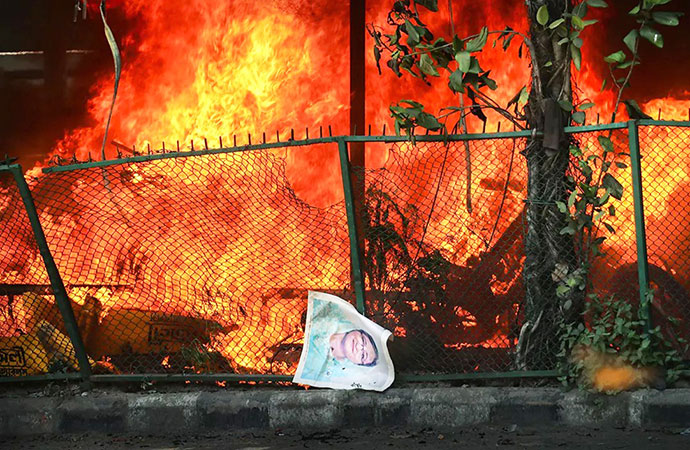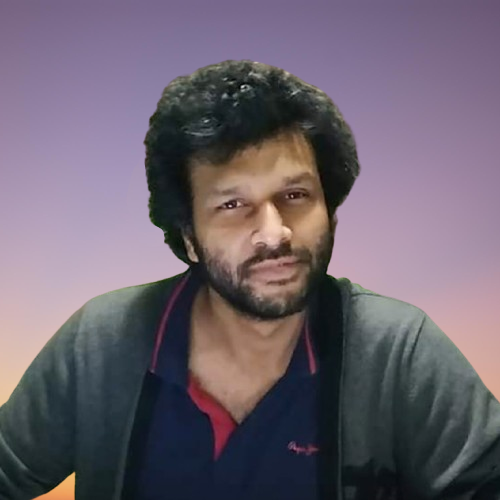Reportage

Photo: Md. Mir Hossen/ UNB
It all began so inauspiciously.
Going into July 2024, there was no indication of what was to come, of what was brewing underneath the surface, of the seething anger amongst all the victims of Sheikh Hasina's rule. Even the 'quota andolon' was essentially a renewal of the movement that had culminated rather prematurely in 2018 with Hasina's short-tempered outburst in Parliament that abolished the entire system of quotas, when Nurul Huq Nur and the movement he had led against it asked for reform. It was possibly the most authoritarian act of her entire tenure, barring the caretaker abolition. Even that was the outcome of a sinister design, a plot to manipulate the system, though it was discouraged by members of her own party. Here, an entire system of how government jobs (56 percent of them!) would be allocated in a country of 18 crore people, was abolished on the whim really, of a prime minister. A temper tantrum. There was no consultation, no committee, no commission - just her desire to see an end to a movement that was disturbing her. There was some amount of poetic justice in how it came back to bite her.
When the Muktijuddho Manch filed a petition for its restoration, there was little to no opposition that it encountered. The Manch bothered itself with only the portion reserved for freedom fighters, 30%, that was filled mostly by the descendants of freedom fighters now, their children or grandchildren - an extension Hasina had instituted soon after coming back to power. In a country where less than 1% of the population were actually freedom fighters, where jobs were already scarce, over 30 times that number of government jobs was being reserved for their descendants, essentially. Even the mathematical permutations of that meant a thriving industry of fake or fraud 'muktijoddhas'. While Hasina and her minions, despite a burgeoning economy built on the backbreaking work of millions, grappled with the phenomenon of 'jobless growth' that economists had identified in Bangladesh as far back as the middle of the last decade. It denoted the strange, and for many economists, inexplicable situation where despite consistent growth in the headline figure of GDP, the Bangladesh economy was obviously failing to provide enough jobs for its people, and this was most notable and indeed crushing, for graduates who couldn't find jobs. You didn't have to be an economist to have heard of the armies of Bangladeshi youth, armed with degrees but unable to find jobs. According to the Labour Force Survey 2022 by the Bangladesh Bureau of Statistics, among graduates, 28 percent were unemployed in 2022 - estimated to be around 8 lakh in the survey.
Graduates also remained unemployed for a long time, as nearly 20 percent waited for two years to find a job, while 15 percent remained jobless for more than two years, as per the BBS data. Additionally, what we're talking about here also refers to underemployment - the demoralising situation of being stuck in jobs for which you're overqualified, or jobs that offer little to no career mobility. Like peons with Masters degrees, etc. We've all seen them. We've all been them.
That was the socioeconomic context which sprung the movement against the restoration of the quota system. There was also the political, which was more straightforward. The Muktijuddho Manch had chosen its moment carefully to launch the court case, clearly in consultation with AL top brass. They held meetings with Obaidul Quader in late 2023, which were reported, and the subject was hardly kept secret, since there was no need to: AL was at the peak of its powers once the BNP was left out of the election set for 2024. Yes, left out, excluded, that is all you can say, when your top leaders are arrested on a false pretext a month before the deadline for filing nominations and then kept in jail throughout, with only those prepared to compete on the government's terms being released in time to fill papers. The case of Shahjahan Omar comes to mind - a BNP leader, Bir Uttam or Bikram, who did live most of his life like a lion, only to capitulate at the last moment in jail. How he must regret it today! People who talk about the overthrow of an 'elected government', or question the legitimacy of the current government, should bear these things in mind.
So coming to the middle of 2024, AL surveyed a horizon in which there was virtually no opposition to its rule, and identified a naturally good moment to rectify "Apa's one mistake" by choreographing the return of the quota for FFs through the courts. An entire industry of fakes and frauds waited in anticipation. The Manch had filed the petition, and on June 4th, the High Court duly returned the expected verdict. The quota for freedom fighters (more their children or grandchildren now) was coming back. The way we know this was being choreographed is important to understand, because the AL narrative these days says there was no need for any movement because the government was fighting on the side of the protesters in court. This hardly reflects the reality. We know this because usually when one of the parties to a dispute disagrees with a court's verdict, they will notify the court of their intention to appeal against the verdict that very day. But the government's lawyers present on that day (June 4th) mentioned no such intention. Not even to reporters afterwards. They would never have done it, were it not for a group of students at Dhaka University who organised themselves under the banner 'Students Against Discrimination' and decided to launch a movement against this sneaky and underhanded move that had now come out into the open.
Some of these students were veterans of the original movement for quota reform led by Nur, who had by now graduated to senior-level politics on the national stage. Many of them, including Nahid Islam and Akhter Hossain, had recently formed a new platform as well, Gonotantrik Chhatra Shakti (Democratic Student Force), that had become a new home of sorts for students fed up with the disruptive, debilitative influence of Chhatra League on students' lives on campus. They attracted mostly well-meaning, conscientious students who liked organising reading circles, where they discussed literature and politics, and were all deeply disturbed by the Abrar Fahad incident that shook the nation in 2019. To the extent that they wanted to live a life of public service, they knew that the Awami League could never be a home for them.
In order to attract a wider swathe of the student population, the SAD (Students Against Discrimination) banner was chosen. But whatever the banner or flag they chose to fly, on a personal level, I have no qualms about admitting that I gave them no chance. Dismissed them out of hand. Even on the limited issue of realising their otherwise just demand regarding quotas. Overthrowing the government was not even in the picture or any stretch of the imagination at this point. The only thing that caught my eye was the somewhat different language they were using. Like 'Bangla Blockade' and one or two of the other early names for their programmes. Even then I can recall and honestly state that my first impressions were of a nuisance. The die was cast for quotas to return, and I saw it as a new political group seizing upon an issue just to gain some early leverage. After 15 years and the mockery AL had made of three different elections in three different ways, I thought politics in this country was over. 'Shob shoirachar er poton hoy' (All dictators fall at some point'). Isn't that what history taught us? Hasina had proved that one wrong as well. Driven by revenge and ambition, she just wanted it more than anyone else, and by June 2024 I was pretty much resigned to letting her have it.
There is a narrative that BNP has developed since August 5, that it was the result of 15 years of effort on their part, a gradual build up of their strength in opposition that progressively weakened AL's hand - I am sorry to say that this is all balderdash. BNP deserves credit for never giving up the fight, for the part it played in the movement after July 15, that allowed them to steer the quota movement towards one demanding the government's resignation in what became a perfect storm of factors that AL proved powerless to resist. We'll discuss this more in the weeks ahead. But there can be no denying that come the summer of 2024, despite internal decay and a growing disconnect with the people, AL was stronger than ever.
In order to understand this, you have to conceptualise power as they saw it. It wasn't in terms of popularity, where they had never even submitted themselves to a test. They didn't draw their legitimacy from the people. It was in the security and administrative structure of the state, the work done by the likes of Tareque Siddique and H.T. Imam, that wouldn't allow anyone else to get a look in. The divvying up of the sociocultural fruits in such a way that everyone had stopped questioning it. The establishment of an oligarchy that made sure the party's activities were well-funded. The systematic dismantling of the electoral system, and even the people's belief in it as a vehicle for change. That there was even any need for change. These are areas in which BNP was making no dent. No one was. That is the context in which those 36 days of July exploded into our conscience. It made it all the more profound, more meaningful, and life-affirming. Shob shoirachar er poton hoy - that's not just one for the books. And that beautiful couplet from Neruda that the movement adopted towards the end, as Hasina's henchmen kept gunning down their brothers and sisters: "You can cut all the flowers. But you cannot stop spring from coming."
That was the gauntlet that a generation threw down at the dictator's feet. They were saying, "You can take all of us out - all of us. But your time is up, prime minister." I referred earlier to Hasina 'wanting it more'. But here she encountered a generation that not only wanted it more, they had paid for it in blood. Who in this world could deny them?

























Leave a Comment
Recent Posts
Pedaling Through the Mangroves ...
The journey from the bustling streets of Barishal to the serene, emera ...
Why the Interim Government mus ...
Two weeks out from what is expected to be a red letter day in the figh ...
Doesn’t matter who thinks what about Bangladesh deci ..
The Other Lenin
US President Donald Trump said his administration
Govt moves to merge BIDA, BEZA, BEPZA, MIDA